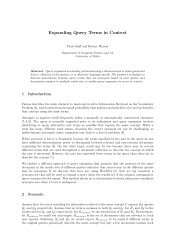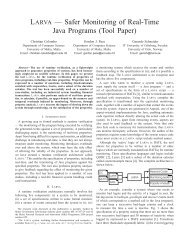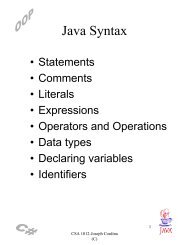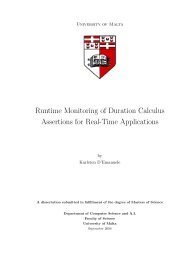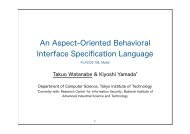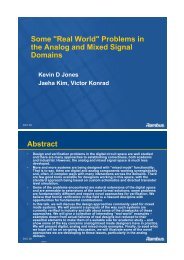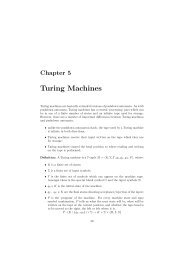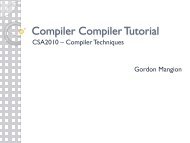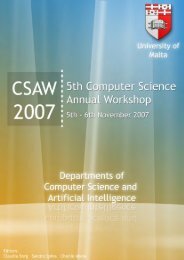Proceedings of CSAW'04 - FTP Directory Listing - University of Malta
Proceedings of CSAW'04 - FTP Directory Listing - University of Malta
Proceedings of CSAW'04 - FTP Directory Listing - University of Malta
You also want an ePaper? Increase the reach of your titles
YUMPU automatically turns print PDFs into web optimized ePapers that Google loves.
The Use <strong>of</strong> Model-Checking for the Verification <strong>of</strong><br />
Concurrent Algorithms<br />
Joseph Cordina<br />
Department <strong>of</strong> Computer Science and AI,<br />
<strong>University</strong> <strong>of</strong> <strong>Malta</strong><br />
Abstract. The design <strong>of</strong> concurrent algorithms tends to be a long and difficult process.<br />
Increasing the number <strong>of</strong> concurrent entities to realistic numbers makes manual verification<br />
<strong>of</strong> these algorithms almost impossible. Designers normally resort to running these algorithms<br />
exhaustively yet can never be guaranteed <strong>of</strong> their correctness. In this report, we propose the<br />
use <strong>of</strong> a model-checker (SMV) as a machine-automated tool for the verification <strong>of</strong> these<br />
algorithms. We present methods how this tool can be used to encode algorithms and allow<br />
properties to be guaranteed for uni-processor machines running a scheduler or SMP machines.<br />
We also present a language-generator allowing the designer to use a description language that<br />
is then automatically converted to the model-checker’s native language. We show how this<br />
approach was successful in encoding a concurrent algorithm and is able to verify the desired<br />
properties.<br />
1 Introduction<br />
Designing any new algorithm tends to be a strenuous and tough mental exercise. This is especially<br />
more difficult when designing concurrent algorithms due to their complex interaction. Commonly<br />
any such algorithm is painstakingly designed and is then dry-run to test for errors. Such errors<br />
normally tested for are deadlocks, memory value inconsistencies, etc. Dry-runs for concurrent algorithms<br />
involve testing each line <strong>of</strong> code when run in parallel with any other line <strong>of</strong> code in its<br />
concurrent counterpart. This ensures that no race-conditions could arise. Understandably this is a<br />
very long and difficult task especially since the problem grows exponentially with the number <strong>of</strong><br />
concurrent tasks present within the system. These algorithms are normally tested in their assembly<br />
format, ensuring the atomicity <strong>of</strong> each instruction but making it more difficult for the designer to<br />
reason with. Often algorithms more than few lines long and running on more than a handful <strong>of</strong><br />
concurrent tasks quickly become impossible to verify manually and thus designers tend to exhaustively<br />
execute them on hardware. While testing on hardware is seen as sufficient by most system<br />
s<strong>of</strong>tware designers, the lack <strong>of</strong> certainty <strong>of</strong> the absence <strong>of</strong> errors makes such algorithms unsuitable<br />
for critical s<strong>of</strong>tware. While novel concurrent algorithms can enhance the potential <strong>of</strong> computer<br />
hardware and s<strong>of</strong>tware, the lack <strong>of</strong> proper execution guarantees makes work on such algorithms<br />
futile.<br />
In this paper we propose the use <strong>of</strong> model-checking to facilitate and provide guarantees for the<br />
construction <strong>of</strong> concurrent algorithms. Such concurrent algorithms are not limited to be used on<br />
single-processor systems (making use <strong>of</strong> an un-deterministic scheduler) but also on synchronous and<br />
symmetric multi-processor algorithms. We also envisage this research to encompass un-synchronous<br />
multi-processor systems. In addition, we propose a meta-language, allowing the designer <strong>of</strong> the<br />
algorithms to concentrate on the construction <strong>of</strong> the algorithms itself and also widen the scope <strong>of</strong><br />
this research to users that are not familiar with model-checking system.



